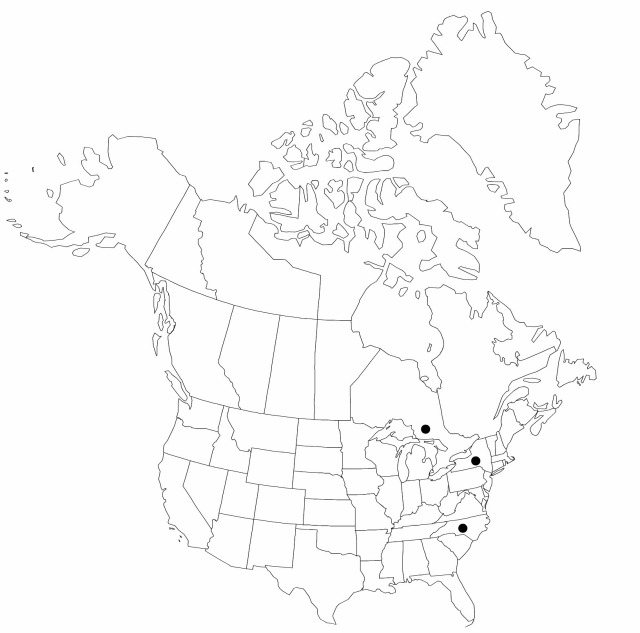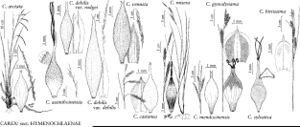Carex sylvatica
Fl. Angl., 353. 1762.
Plants densely cespitose. Culms pale brown to ivory at base, sometimes with a few brown fibrillose remains of previous year’s leaves, but not densely covered with fibrils; flowering stems 25–110(–200) cm, longer than leaves at maturity, 1–1.3 mm thick, glabrous. Leaves: sheaths glabrous, proximal ones ivory grading distally to light green, all bearing blades, pale hyaline on front; blades flat, (3–)5.5–8.5(–15) mm wide, glabrous on both surfaces, finely scabrous on margins. Inflorescences: peduncles of lateral spikes 5–20 mm, scabrous; peduncle of terminal spike less than 20 mm, scabrous; proximal bracts usually shorter than entire inflorescence; sheaths 20–100 mm; blades 2–3 mm wide. Lateral spikes: 3–5, 1 per node, the proximal well separated, erect to somewhat nodding, distal ones crowded near apex; proximal spikes pistillate with 15–40 spreading perigynia attached 1–1.5 mm apart, cylindric to elongate, 15–60 × 3–5 mm; distal spikes staminate or androgynous. Terminal spike staminate or androgynous with a few pistillate flowers at base, 15–40 × 2.5–3 mm. Pistillate scales white-hyaline with broad green midrib, oblong-lanceolate, shorter than mature perigynia, apex acute, cuspidate, or awned, glabrous. Perigynia green maturing to light brown, conspicuously 2-ribbed but otherwise veinless except for short inconpicuous veins at base, substipitate, tightly enveloping achene, obovoid, 4.5–6 × 1.4–1.8 mm, membranous, apex abruptly narrowed to tubular beak, glabrous; beak bidentate, slender, 2–3 mm, teeth 1 mm. Achenes sessile, 2.2–2.6 × 1.2–1.5 mm. 2n = 58 (Czechoslovakia, Germany, Great Britain, Iberian Peninsula, Poland, Sweden)
Phenology: Fruiting summer.
Habitat: Disturbed areas in deciduous forests
Distribution

Introduced; Ont., N.Y., N.C., Europe, introduced New Zealand.
Discussion
No hybrids are reported in the flora, although in Europe Carex sylvatica hybridizes with C. strigosa and C. hirta.
Selected References
None.
